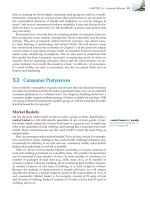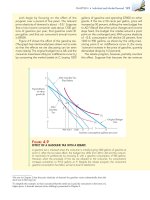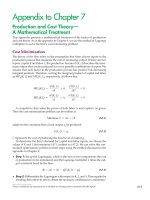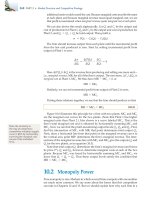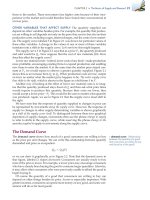(8th edition) (the pearson series in economics) robert pindyck, daniel rubinfeld microecon 140
Bạn đang xem bản rút gọn của tài liệu. Xem và tải ngay bản đầy đủ của tài liệu tại đây (110.53 KB, 1 trang )
CHAPTER 4 • Individual and Market Demand 115
Clothing
(units per
month)
Income-Consumption
Curve
7
D
U3
5
B
3
A
4
U2
U1
10
16
Food (units
per month)
(a)
G
E
EFFECT OF INCOME CHANGES
An increase in income, with the prices of all goods fixed, causes
consumers to alter their choice of market baskets. In part (a), the
baskets that maximize consumer satisfaction for various incomes
(point A, $10; B, $20; D, $30) trace out the income-consumption
curve. The shift to the right of the demand curve in response to
the increases in income is shown in part (b). (Points E, G, and H
correspond to points A, B, and D, respectively.)
Price
of
food
$1.00
F IGURE 4.2
H
D3
D2
D1
4
10
16
(b)
Food (units
per month)
measured for a particular level of income, any change in income must lead
to a shift in the demand curve itself. Thus A on the income-consumption curve
in Figure 4.2 (a) corresponds to E on demand curve D1 in Figure 4.2 (b);
B corresponds to G on a different demand curve D2. The upward-sloping
income-consumption curve implies that an increase in income causes a shift to
the right in the demand curve—in this case from D1 to D2 to D3.
Normal versus Inferior Goods
When the income-consumption curve has a positive slope, the quantity
demanded increases with income. As a result, the income elasticity of demand
is positive. The greater the shifts to the right of the demand curve, the larger
the income elasticity. In this case, the goods are described as normal: Consumers
want to buy more of them as their incomes increase.
In some cases, the quantity demanded falls as income increases; the income
elasticity of demand is negative. We then describe the good as inferior. The term
inferior simply means that consumption falls when income rises. Hamburger, for
example, is inferior for some people: As their income increases, they buy less
hamburger and more steak.
In §2.4, we explain that the
income elasticity of demand
is the percentage change
in the quantity demanded
resulting from a 1-percent
increase in income.

